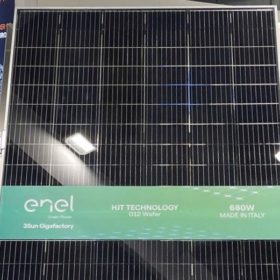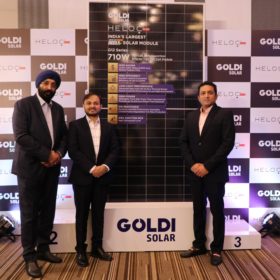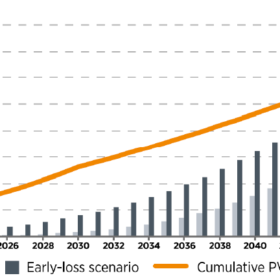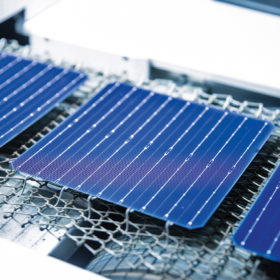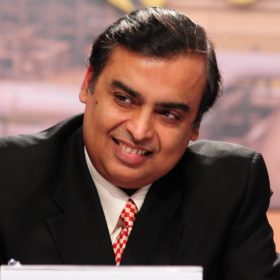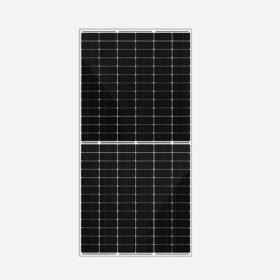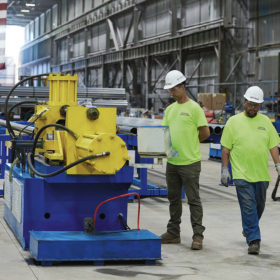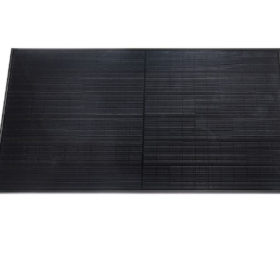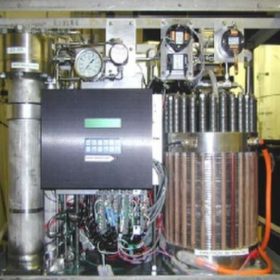Enel unveils 680 W n-type heterojunction solar panel for utility-scale applications
Enel Green Power’s new solar panel has average efficiencies ranging from 22.6% to 22.9% and a temperature coefficient of -0.24% per degree Celsius. It is based on an n-type solar cell with G12 format and a power conversion efficiency of 24.6%.
Goldi Solar unveils 710 Wp HJT module, plans for massive expansion by 2025
The Indian manufacturer has unveiled a 710 Wp bifacial solar module based on the heterojunction (HJT) technology. It also announced plans to invest over INR 5,000 crore ($613 million) to expand its module capacity to 6 GW, build 5 GW of new cell manufacturing capacity, and start auxiliary production by 2025.
IEA PVSP predicts high-cost, low-revenue scenario for solar recycling
A recent report by the International Energy Agency Photovoltaic Power Systems Programme (IEA PVSP) reviews the current regulatory and industrial landscape for end-of-life PV management in Germany, France, Italy, Spain, Japan, South Korea, China, Australia, and the United States.
The long read: Integrated solar manufacturing giants emerge
The giants of the Chinese PV industry are now integrated along both ends of the supply chain, amid expectations for strong demand and price volatility. Module makers are adding polysilicon capacity, while poly and wafer producers are making module production a part of their business. But do companies still face the same risks that have brought down vertically integrated solar giants in the past? Vincent Shaw reports from Shanghai.
Reliance New Energy to invest in perovskite solar startup Caelux
The new energy arm of Reliance Industries has signed the agreement to acquire a 20% stake in California-based perovskite solar startup Caelux for $12 million. The investment will accelerate Caelux’ product development and commercialization.
Navitas unveils 605 W mono PERC module
The Indian solar manufacturer has unveiled Bonito Max series 605W mono PERC module featuring 156 half-cells and a 10-busbar design. The module’s power conversion efficiency is 21.64%.
A new era of made-in-USA solar
There are both challenges and benefits to boosting solar manufacturing in America. The Inflation Reduction Act of 2022 includes a host of measures to support the production of US renewable energy technologies and could foster a new era for made-in-America solar. pv magazine USA Senior Editor Anne Fischer explores the current status and outlook of US solar manufacturing.
Panasonic presents 22.2% efficient all-black heterojunction solar module compatible with its Evervolt battery
The new module series has a power output ranging from 420 to 430 W, a temperature coefficient of -0.26% per degree Celsius, and an efficiency of up to 22.2%.
Cabinet approves second tranche of PLI Scheme for solar manufacturing
The second tranche of the production-linked incentive scheme for high-efficiency solar module manufacturing has a budgetary outlay of INR 19,500 crore.
India’s electrolyzer manufacturing capacity will reach 8 GW per year by 2025, says Rystad
India will have six hydrogen electrolyzer gigafactories operational by 2025, aggregating to a combined annual capacity of over 8 GW.
